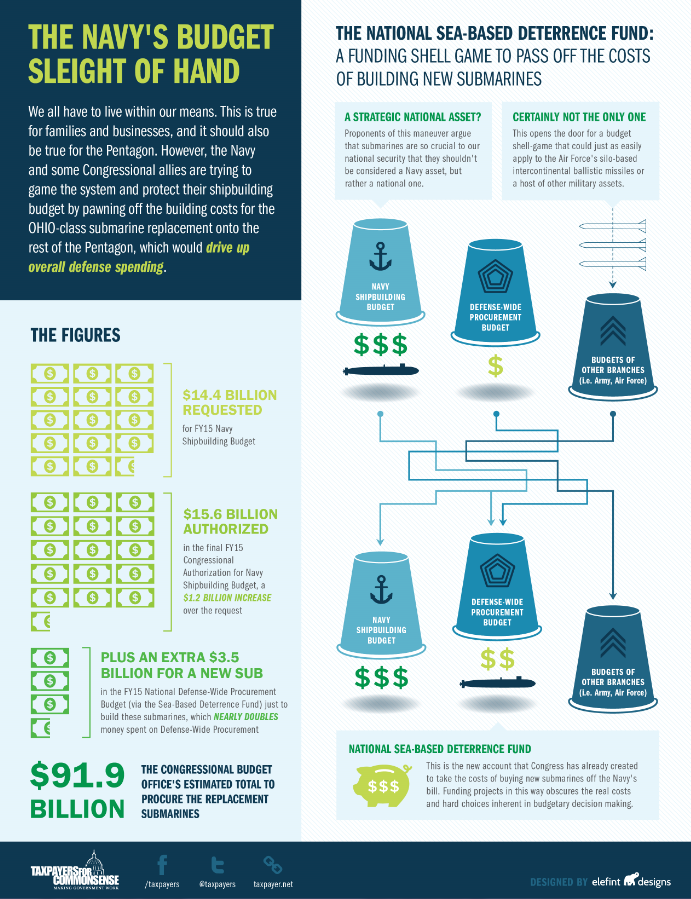Budget gimmicks seem to be the new normal in Washington. Straightforward budgeting, where the president proposes and the Congress disposes, has gone the way of the tri-cornered hat. And nowhere is that more obvious than the manipulation of the Pentagon budget.
Don't like the caps on military spending set by the Budget Control Act of 2011? No problem! Congress can pump up the Overseas Contingency Operations line for the Pentagon because it is, magically, “off budget.” It doesn't count against the caps. How great is that?
It's not so great when you consider that the Overseas Contingency Operations budget still contributes to the deficit. There is no magic money, and no “Jack and the Beanstalk”-style magic beans to grow a tree tall enough to allow us to clamber over this mountain of debt. Because, let's remember, the so-called super committee and the Budget Control Act promised the American taxpayer $1.2 trillion in deficit reduction. The Overseas Contingency Operation gimmick is a transparent method of avoiding that responsibility.
But it's not the only gimmick. As I've written about before, Congress has invented another pot of magic money named the National Sea-based Deterrence Fund. This new fund takes the cost of building a new class of ballistic missile submarines, sometimes called “SSBN(X),” out of the Navy's shipbuilding budget. And those of us used to budgeting in a straightforward manner might ask, “Where else would you put money to buy a submarine?” Hold on to your tri-cornered hat, because some factions in Congress want to put that money into the “defense wide” procurement budget, relieving the Navy of the procurement expense last pegged by the Congressional Budget Office as roughly $92 billion. Mind you, the Navy's shipbuilding budget would remain steady at about $15 billion per year. So this budget dodge doesn't actually save the taxpayers any money, it just relieves the Navy of the burden. Confused? Here's an infographic that may help to explain.
What's the rationale for this approach? Proponents argue that submarines are so crucial to our national security that they shouldn't be considered a Navy asset, but a national asset instead. So my question is this: Aren't aircraft carriers also national assets? How about silo-based intercontinental ballistic missiles? This way madness lies for the budgeting process.
There was a valiant attempt last week by Rep. Earl Blumenauer, D-Ore., to amend the Pentagon policy bill to move the submarine money back to the Navy's shipbuilding accounts. The amendment was offered to the National Defense Authorization bill and it lost by a spectacular margin.
Mind you, this amendment didn't cut the funds; it didn't have one negative thing to say about the need to build a new class of ballistic missile subs. All it attempted to do was instill some old-fashioned budget rigor and common sense. Unfortunately the labor unions, in a classic story of strange political bedfellows, consorted with the defense hawks in the House to kill this idea. Unfounded parochial fears that shipbuilding jobs would be lost contributed to this defeat. (Remember, the regular shipbuilding accounts weren't being cut by a single penny.)
Now enter the House Appropriations Committee. These folks with their sharpened pencils and their green eye shades are the only ones who write legislation that actually allows any federal funds to be spent. What do the appropriators have to say about the National Sea-based Deterrence Fund? In Section 8122 of the recently drafted Department of Defense Appropriations Bill for fiscal year 2016 we have our answer: “None of the funds provided in this or any other Act may be transferred to the National Sea Based Deterrent (sic) Fund established by section 2218a of title 10, United States Code.”
Hallelujah! Common sense at last on this topic. (If only the House Appropriators had taken similar actions on the Overseas Contingency Operations account gimmick, but baby steps.) And, given that the Senate Appropriations Committee has several senior members from states where shipbuilding reigns supreme, we'll have to watch to see how they draft their bill. And I'll be writing more about this as the year progresses. Because gimmicks are the new normal.














Get Social